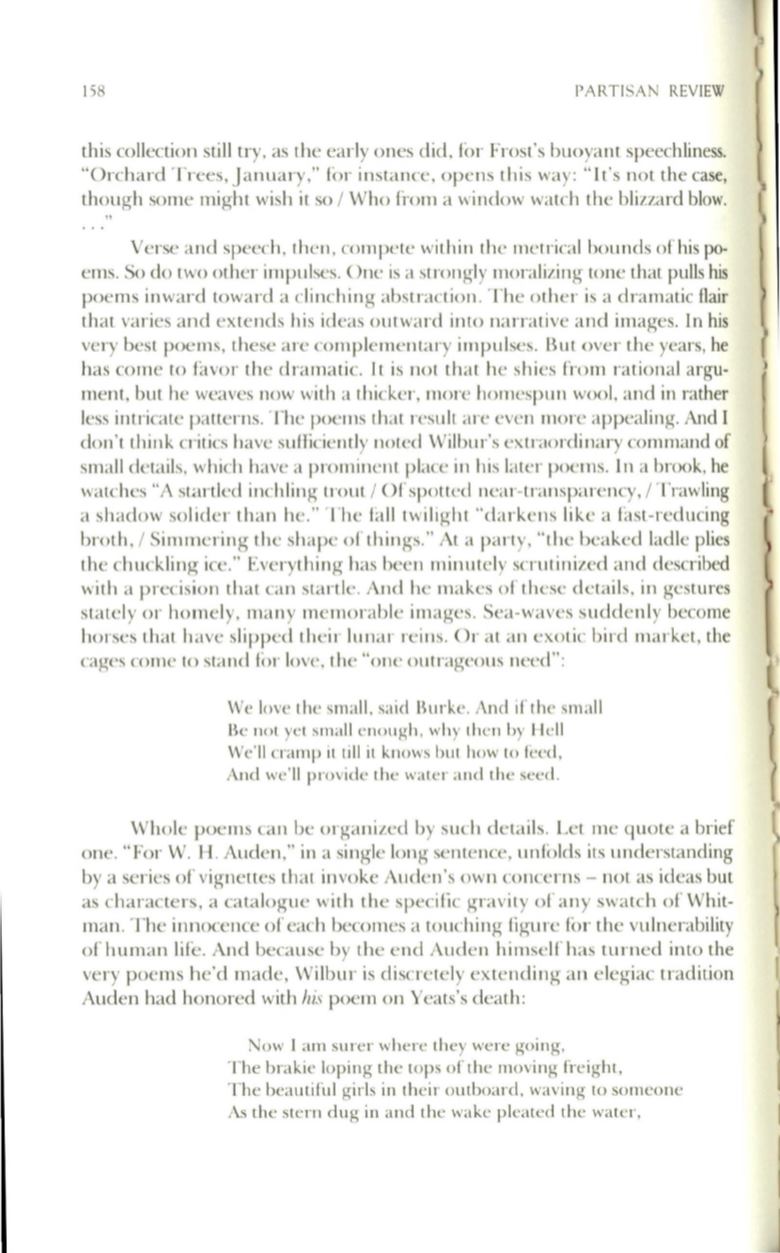
158
PARTISAN REVIEW
this collection still try, as the early ones did, for Frost's buoyant speechliness.
"Orchard Trees, January," for instance, opens this way: " It's not the case,
though some might wish it so / Who fi-om a window watch the blizzard blow.
Verse and speech, then, compete within the metrical bounds of his po–
ems. So do two other impulses. One is a strongly moralizing tone that pulls his
poems inward toward a clinching abstraction. The other is a dramatic flair
that varies and extends his ideas outward into narrative and images. In his
r
very best poems, these are complementary impulses. But over the years, he
has come to favor the dramatic. It is not that he shies from rational argu-
)
me
nt,
but he weaves now with a thicker, more homespun wool, and in rather
less intricate patterns. The poems that result are even more appealing. And I
don't think critics have sufficiently noted Wilbur's extraordinar'y command of
small details, which have a prominent place in his later poems. In a brook, he
watches "A startled inch ling trout / Of spotted near-transparency, / Trawling
a shadow solider than he." The fall twilight "darkens like a fast-reducing
broth, / Simmering the shape of things." At a party, "the beaked ladle plies
the chuckling ice." Everything has been minutely scrutin ized and described
with a precision that can startle. And he makes of these details, in gestures
stately or homely, many memorable images. Sea-waves suddenly become
horses that have slipped their lunar reins. Or at an exotic bird market, the
cages come to stand for love, the "one outrageous need":
We love the small, said Burke. And if the small
Be not yet small enough, why then by Hell
We'll cramp it ti ll it knows but how to feed ,
And we'll provide the water and the seed.
Whole poems can be organized by such details. Let me quote a brief
one. "For W.
H .
Auden," in a single long sentence, unfolds its understanding
by a series of vignettes that invoke Auden's own concerns - not as ideas but
as characters, a catalogue with the specific gravity of any swatch of Whit–
man. The innocence of each becomes a touching figure for the vulnerability
of human life. And because by the end Auden himself has turned into the
very poems he'd made, Wilbur is discretely extending an elegiac tradition
Auden had honored with
hi,
poem on Yeats's death:
Now
I
am suret' whet'e they were going,
The bt'akie loping the tops of the moving freight,
The beautiful girls in their outboard, waving to someone
As
the stern dug in and the wake pleated the waLer,


